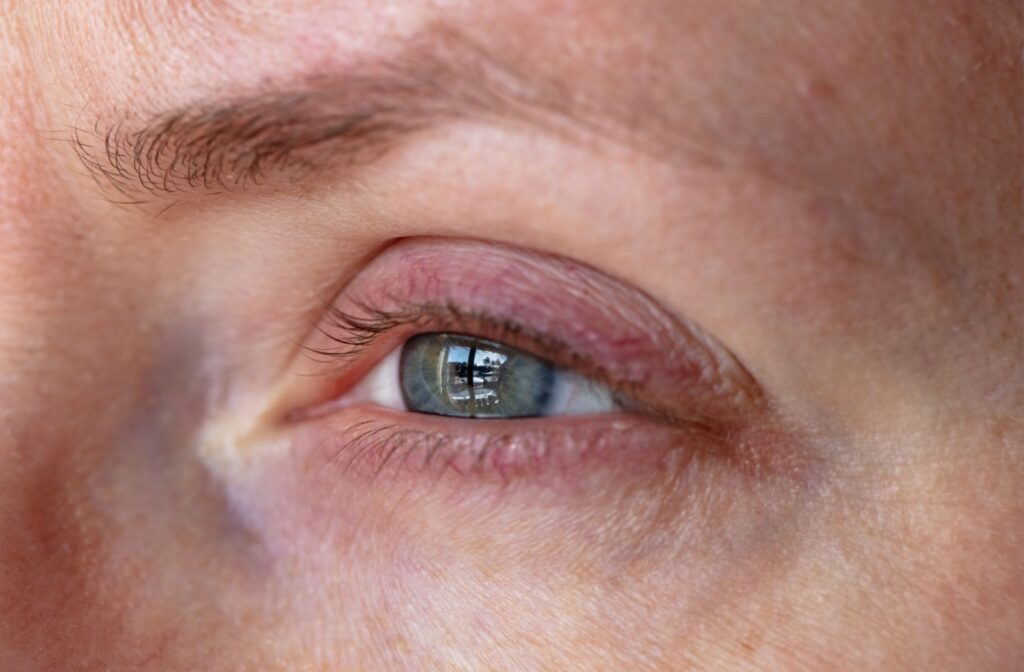Have you ever experienced the uncomfortable sensation of burning and watering eyes? If so, you are not alone. Many people experience dry eye symptoms, which can be caused by various factors. Your eye doctor can help you understand what may be causing your symptoms.
Here are some possible reasons for why your eyes may be burning and watering:
- Dry Eye Syndrome
- Allergies
- Irritation from Foreign Objects
- Conjunctivitis (Pink Eye)
- Contact Lens Irritation
Dry Eye Syndrome
Dry eye syndrome occurs when the eyes do not produce enough or poor-quality tears. It can be caused by various factors, including age, medications, and environmental conditions.
When the eyes are not adequately lubricated, they can become red, itchy, and uncomfortable. It may seem counterintuitive, but lack of lubrication can also lead to excessive tearing as the eyes try to compensate for reduced moisture.
Symptoms: Dry eye syndrome can cause a stinging or burning sensation, redness, blurred vision, and a feeling of something stuck in the eye.
Treatment: Your eye doctor may recommend artificial tears or prescribed medication to help alleviate dry eye symptoms. For more chronic dry eye cases, 2 popular dry eye therapies offered at Eye Lab include:
- TearCare—uses targeted thermal energy to heat clogged glands in your eyelid to improve the quality of your tears.
- TempSure—utilizes radiofrequency technology to stimulate tear production and alleviate discomfort associated with dry eye syndrome, providing lasting relief for patients.
Allergies
Allergies are a common cause of burning and watering eyes. When the eyes come into contact with an allergen, such as pollen or pet dander, they can become red, itchy, and watery. The body produces histamines in response to the allergen, which causes inflammation in the eyes.
Symptoms: Allergic reactions in the eyes can also cause swelling, a burning sensation, and sensitivity to light.
Treatment: Avoiding allergens is the best way to prevent allergy-related eye symptoms. For instance, if you’re allergic to dust, dander, or grass, you should avoid environments where they are present. Over-the-counter antihistamines or prescription medication from your doctor can also help alleviate symptoms.
Irritation from Foreign Objects
If something gets into your eye, such as dust, dirt, or grit, the body’s natural response is to produce tears to flush out the irritant.
Symptoms: In addition to burning and watering, you may experience pain, redness, and sensitivity to light.
Treatment: If you have a foreign object in your eye, do not rub it, as this can cause further damage. Instead, try blinking rapidly or using artificial tears to help flush out the object. If the irritation persists, seek medical attention.
Conjunctivitis (Pink Eye)
Conjunctivitis, commonly known as pink eye, is an inflammation of the conjunctiva, the transparent membrane covering the eye’s white part. A bacterial or viral infection, allergies, or irritants can cause it.
Symptoms: Pink eye can cause redness, itchiness, watery eyes, and discharge.
Treatment: Treatment for conjunctivitis depends on the cause. Antibiotic eye drops or ointments can be prescribed for bacterial infections, while viral conjunctivitis usually clears up within a week or two. Allergy-related pink eye can be treated with antihistamines.
Contact Lens Irritation
Wearing contact lenses for extended periods or not properly cleaning and caring for them can lead to irritation and discomfort in the eyes. Failing to care for contact lenses properly can also increase the risk of eye infections.
Symptoms: Contact lens irritation can cause redness, itchiness, blurry vision, and discomfort when wearing contacts.
Treatment: Properly cleaning and caring for your contact lenses is essential to prevent irritation and infections. If you experience persistent discomfort, consult your eye doctor, as it may indicate an underlying issue or allergy to the contact solution.

What to Do If You Experience Eye Irritation
If you experience any eye irritation, it’s essential to seek medical attention if the symptoms persist or worsen. In addition, you can take these steps to help alleviate discomfort and promote healing:
- Avoid rubbing your eyes, as it can aggravate irritation.
- Use artificial tears to help soothe dryness and flush out irritants.
- Take breaks from extended screen time to give your eyes a rest.
- Practice good hygiene and avoid touching or rubbing your eyes with unwashed hands.
- If you wear contact lenses, follow proper cleaning and wearing instructions to prevent irritation and infections.
- Use a cold compress to help reduce any swelling or redness.
- Consult your eye doctor if the irritation persists for more than a few days or if you have other concerning symptoms such as discharge, pain, or vision changes.
Prioritize Your Vision With Expert Eye Care Services at Eye Lab
Although eye irritation is common, it’s important not to ignore persistent symptoms as they can be a sign of a more serious issue. Taking precautions and adequately caring for your eyes can prevent and effectively treat eye irritation to maintain healthy vision.
At Eye Lab, we understand the importance of proper eye care and offer comprehensive services to address any concerns or issues you may have. Don’t hesitate to schedule an appointment with us if you are experiencing eye irritation or have other vision-related concerns. Your eyesight is precious and should be cared for with diligence and attention.





